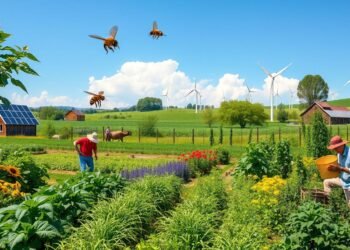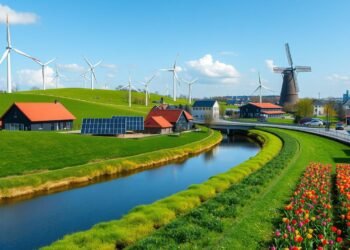Are you ready to grow a career that feeds both people and the planet? Sustainable food systems jobs are booming in the eco-friendly industry. They cover the whole food chain, from farm to table, aiming to help our climate and communities.
The global food industry is huge, causing a quarter of greenhouse gas emissions and using half of the world’s land. By picking a career in sustainable food, you can change agriculture, ensure food for everyone, and build a greener world.
In the US, the average farmer is 58.3 years old, making it urgent to bring in new faces. Groups like the National Young Farmers Coalition and The Greenhorns are helping the next generation of sustainable farmers.
But it’s not just about farming. Sustainable food jobs are popping up everywhere. The Culinary Institute of America is teaching sustainability in cooking. And universities like Johns Hopkins are linking food systems to community health.
Key Takeaways
- Sustainable food systems jobs span various sectors, from farming to policy-making
- The aging farming workforce creates opportunities for new entrants
- Culinary and public health programs are integrating sustainability
- Organizations offer support for those interested in sustainable agriculture
- Salaries in sustainable food jobs vary, with the chance for growth
Understanding Sustainable Food Systems
Sustainable food systems aim to share food fairly and protect our planet. They use practices like agroecology, organic agriculture, and agroforestry. These methods improve food security worldwide by changing how we produce, distribute, and dispose of food.
What Are Sustainable Food Systems?
Sustainable food systems balance food making and protecting the environment. They use agroecology, which applies ecological rules to farming. Organic agriculture avoids harmful chemicals and fertilizers.
Agroforestry mixes trees with crops or animals, boosting biodiversity and soil health.
Importance of Sustainable Practices
Sustainable practices are key to solving global food issues. The food industry is a big polluter and uses a lot of land. Sustainable farming reduces these problems.
Jobs in sustainable food cover many areas, like food security, policy, and health. These roles help fight climate change and improve the environment. They also work to make the food system fair for everyone.
You don’t need a food science degree to work in sustainable food. The field values many skills, from finance to journalism. This variety is important for a fair food system that includes all communities. As demand for sustainability grows, so do job chances in this critical field.
Types of Sustainable Food Systems Jobs
The field of sustainable food systems has many career paths. You can work from farm to table or advocate for food justice. There’s a role for everyone’s passion. Let’s look at some key areas where you can make a difference.
Agricultural Roles
Sustainable farming is central to the food system. Agricultural and Food Scientists make a median of $69,920. They see a 7% job growth from 2016 to 2026. These experts create new products and improve farming.
Jobs like organic farmers and permaculture designers are also important. They work directly with the land.
Food Policy and Advocacy
Food justice advocacy is key for big changes. Public Health educators in food and nutrition see 9-13% job growth. They earn a median of $51,960.
These roles shape policies and promote fair food access. Community food security jobs fall under this category. They aim to make sure everyone gets nutritious food.
Education and Outreach
Teaching about sustainable food systems is essential. School Foodservice managers earn a median of $50,820. They play a big role in teaching kids.
Marketing and promotions managers in food and nutrition make $127,560 on average. They help spread the word about sustainable food. These jobs are expected to grow 10% by 2026.
Skills Needed for Sustainable Food Systems Careers
Careers in sustainable food systems need a mix of skills. You must be well-rounded, with both soft and technical skills. Let’s look at the key abilities that make you stand out in this field.
Communication Skills
Good communication is key in sustainable food systems. You’ll need to share complex ideas simply. This is for talking to the public, pitching ideas, or working with farmers.
Writing reports, giving talks, and networking are common tasks. These skills are important for roles like community nutrition organizers or food marketing managers.
Analytical Skills
Food systems analysis is a big part of many jobs. You’ll need to understand data, solve problems, and think deeply. These skills are great for research coordinators and food trade analysts.
Knowing how food supply chains and regulations work is important. Analytical thinking helps find solutions to big food system problems.
Technical Knowledge
Knowing about sustainable agriculture is vital for many jobs. This includes farming practices, food science, or environmental management. Technical skills are useful for roles like farm-to-fork coordinators or food processing inspectors.
Understanding how food systems affect nutrition and health is also key. Many in this field come from public health or social sciences.
Working on these skills can lead to many career paths in sustainable food systems. From public policy to eco-tourism, the choices are wide. Remember, always keep learning in this changing field.
Education and Training Paths
Sustainable food systems education offers many paths for career growth. Many roles welcome people from different backgrounds. Specialized training can improve your chances.
The field’s median pay is $76,400 per year. This shows its value in today’s job market.
Relevant Degrees and Certifications
Bachelor’s degrees in food science, nutrition, or agriculture are a good start. Certifications in organic farming or food safety can boost your skills. These credentials match the industry’s 6% job growth forecast.
By 2032, 2,100 new jobs will appear in this sector. This growth is faster than average.
Online Courses and Workshops
There are many flexible learning options for newbies and those looking to improve. Online courses in sustainable food systems education fit any schedule. The Good Food Institute is a global example of learning opportunities.
Organizations like GFI offer good salaries and benefits. They value well-educated professionals in sustainable food systems. Their commitment to diversity and following employment laws shows the field’s inclusive nature.
Major Industries Hiring for Sustainable Food Systems
The sustainable food industry is growing fast, with a $2.6 trillion annual sector. It employs over 15.6 million people in the United States. This growth has opened up many job opportunities in different areas, from farming to food science.
Nonprofit Organizations
Nonprofit groups are key in sustainable food systems. They have jobs in advocacy, community outreach, and education. These groups work to solve food access problems and promote healthy eating, mainly in low-income areas where fresh food is hard to find.
Government Agencies
Government agencies have jobs in food policy, research, and regulation. Planners, who make about $64,000 in Pennsylvania, shape food environments and look at access issues. They help make policies that affect food availability in communities, impacting school lunches and urban farming.
Private Sector Companies
The private sector has many jobs in regenerative agriculture. Sustainable farms, food processors, and eco-friendly restaurants need workers in production and local food supply chain roles. Organic farmers can make up to $70,110 a year, and food scientists earn a median of $63,950. These jobs are important for developing sustainable practices and meeting the demand for green food options.
Locations with the Most Job Opportunities
Job chances in sustainable food systems vary between cities and countryside. Urban areas are booming with jobs in food policy, community gardens, and green restaurants. In contrast, rural spots offer a wealth of farming roles, from traditional farming to advanced research.
Urban vs. Rural Job Markets
Cities are creating new jobs in urban farming, like garden coordinators and green restaurant managers. Rural areas, on the other hand, are filled with farming jobs, including regenerative farming and research. Food Scientists earn about $57,009, while those in agriculture and food research make around $93,460 a year.
Best States for Sustainable Food Jobs
States with strong farming industries or green policies have the most sustainable food jobs. California, Vermont, and Oregon are leaders. Colorado is also becoming a key place, thanks to its location in the Colorado River valley. Jobs range from Farm Apprentices to Program Directors, with salaries up to $80,000 a year.
There are many job options across the country. Whether you’re interested in urban farming in cities or rural farming in beautiful areas, the sustainable food sector has much to offer. It’s a great field for those who want to make a difference in the environment.
Networking in the Sustainable Food Sector
Building connections in the sustainable food industry is essential for success. Professional relationships open doors to new opportunities and help share knowledge. The sustainable food sector relies on teamwork, making networking a key skill for career growth.
Importance of Professional Connections
In the sustainable food world, who you know matters a lot. Networking keeps you in the loop on industry trends and job openings. It also connects you with mentors. Groups like the National Young Farmers Coalition offer places to meet others in eco-agriculture.
Online Networking Platforms
The digital world has changed how we network in eco-agriculture. LinkedIn is a key place for sustainable food connections, where you can show off your skills and meet others. Job boards like Roots to Work focus on green jobs, helping you find the right fit.
Don’t forget the value of in-person events. Conferences, workshops, and local food events are great for making connections. They bring together people from all walks of sustainable food, from farmers to policy makers. By using both online and offline networking, you’ll grow a strong network in eco-agriculture.
Salary Expectations for Sustainable Food Systems Jobs
Salaries in sustainable food jobs vary a lot. Entry-level jobs usually pay between $40,000 and $77,400 a year. As you gain more experience, your salary can go up a lot.
Mid-career roles in sustainable food can earn between $61,008 and $120,000 a year. This shows how salaries can grow with experience.
Entry-Level vs. Experienced Roles
Starting out, jobs like food security specialists or campus sustainability coordinators pay around $54,000 to $62,059. With more experience, you can move up. Crop managers can earn up to $75,000, and sustainability consultants can make over $80,000 a year.
At the top, senior roles in eco-agriculture can earn between $100,000 and $191,900 a year. This shows the high earning possibilities in this field.
Factors Affecting Salary
Where you work greatly affects your salary. For example, a Program Manager in the US can earn between $62,950 and $106,811. Your education and skills also play a big role in how much you earn.
Chief sustainability executives earn the most, with average salaries of $166,910 a year. The type of employer also matters. Nonprofits might pay less than corporate jobs. As demand for sustainable food grows, so will salaries, making it a promising career.
Overcoming Challenges in the Job Market
The sustainable food job market has its own set of challenges. Many rural high schools lack programs in agri-food, affecting disadvantaged students. Parents often discourage kids from pursuing agriculture, seeing it as old-fashioned. This leads to a shortage of skills in eco-agriculture and sustainable food systems.
Competition in Sustainable Industries
The competition in sustainable food is intense. The USDA says there are 60,000 high-skilled agriculture jobs available every year. But, only 35,000 graduates can fill them. This shows a big opportunity and a challenge at the same time.
To stand out, focus on skills like adaptive farming, data analytics, and resilient food supply chains. These can help you shine in a crowded field.
Skill Gaps to Address
Developing eco-agriculture skills is key to success. The shift to a greener economy could bring 24 million new jobs worldwide by 2030. To be part of this growth, focus on important areas.
Learn about sustainable farming, food supply chain management, and consumer health. Get hands-on experience through internships or volunteer work. Keep up with new tech like drones and blockchain in agriculture. By filling these skill gaps, you’ll be ready to succeed in the sustainable food job market.
Future Trends in Sustainable Food Systems Employment
The job market for sustainable food systems is booming. More people care about the environment, leading to a higher demand for green food production. This growth opens up new career paths in eco-agriculture and sustainable food.
Growing Awareness and Demand
Consumers are now more aware of their food’s origin and production. This change boosts sustainable agriculture. In Africa, the food market could hit a trillion dollars by 2030, creating millions of jobs.
Countries like Ethiopia, Malawi, and Uganda see over 70% of their jobs coming from food systems by 2025. This is a big opportunity for the future.
Emerging Job Roles
New jobs are popping up in sustainable food. Urban vertical farming specialists are needed as cities aim to grow food locally. Food waste reduction managers help companies reduce their environmental footprint.
Sustainable packaging designers create green solutions for food products. Technology is also changing farming, creating jobs in precision agriculture and data analysis.
Climate change is affecting food production, making experts in climate-resilient agriculture and food security planning more sought after. These careers offer exciting chances for those who want to make food systems more sustainable.
Building a Sustainable Career Path
Starting a career in sustainable food systems needs careful planning and hands-on experience. First, set clear goals and map out the skills you need. Think about your future goals and plan the steps to reach them.
Creating a Career Development Plan
Research different roles in sustainable agriculture. Look into jobs like organic farming specialist, greenhouse manager, or agroecologist. Each job has specific skills and knowledge needed.
Make a list of what you need to learn and set deadlines. Getting a master’s degree or certification in agronomy or agricultural economics can help your career.
Gaining Practical Experience
Eco-agriculture experience is key for jobs in this field. Look for internships, volunteer opportunities, or apprenticeships with sustainable farms or food organizations. Programs like FoodCorps offer year-long positions for hands-on skills.
You can also start small projects in your community, like a neighborhood garden or local food initiative. These experiences show your commitment and practical skills in sustainable food systems.
Remember to network and stay informed about industry trends. Attend conferences, join agricultural associations, and connect with local farming communities. Keep learning about new technologies in precision farming and data analytics. By focusing on continuous growth and adapting to changes, you’ll build a strong and sustainable career in food systems.
Resources for Job Seekers
Looking for a job in sustainable food systems is exciting. Many online platforms and organizations have valuable resources for those who care about the environment. These tools help you find jobs and connect with others in the field.
Websites for Job Listings
Several websites focus on jobs in sustainable food. Good Food Jobs is a search engine for food industry jobs. COMFOODJOBS posts jobs in sustainable food systems. Orion Grassroots Jobsource lists green jobs, including farming and food roles.
The USDA Jobs portal shows jobs in the U.S. Department of Agriculture. These websites are great for finding your next job.
Professional Organizations and Associations
Eco-agriculture associations are key for networking and career growth. The North American Food Systems Network has job listings. The Fair Trade Federation has a jobs board for fair trade jobs.
For farming jobs, check out ATTRA. They list sustainable farming internships and apprenticeships in the U.S. Don’t forget to look at local resources too.
The Cornell Small Farms Program newsletter lists jobs in New York. Vermont Farm to Plate shares Vermont food sector jobs. Using these resources will help you start your sustainable food systems career.
FAQ
What are sustainable food systems jobs?
Sustainable food systems jobs help the planet and improve our lives. They focus on making food systems better for everyone. These jobs aim to reduce the environmental harm caused by the food industry.
What skills are needed for sustainable food systems careers?
You need good communication and problem-solving skills. Knowing about sustainable farming or food science is also important. Being adaptable and passionate about sustainability is key.
What types of jobs are available in sustainable food systems?
There are many jobs in sustainable food systems. You can work in farming, food policy, innovation, and more. Even in restaurants and community gardens, there are opportunities.
What education is required for a career in sustainable food systems?
You can get a degree in food science or agriculture. But, many jobs welcome people from different backgrounds. Getting certified in organic farming can help your career.
Where can I find job opportunities in sustainable food systems?
Look for jobs in nonprofits, government, and private companies. Websites like Roots to Work and GoodFood Jobs list jobs. Professional organizations also offer job resources.
How does the job market differ between urban and rural areas?
Urban areas have jobs in food policy and gardens. Rural areas offer farming and research jobs. States like California and Vermont have more opportunities.
What are the salary expectations for sustainable food systems jobs?
Salaries vary based on the job and experience. Entry-level jobs may pay less, but experience can increase earnings. Location and employer size also affect salary.
How can I overcome challenges in the sustainable food job market?
Develop unique skills that combine sustainability with other areas. Learn continuously and be open to starting small. Flexibility and experience are important.
What are the future trends in sustainable food systems employment?
The future is bright with more focus on sustainability. New jobs will emerge in vertical farming and food waste reduction. Technology will create more positions in agriculture.
How can I build a career in sustainable food systems?
Plan your career and gain experience. Create a plan, identify skills, and learn continuously. Start small projects to show your commitment.





